The immersive futuristic technology Metaverse, the next iteration of the internet, has already become a popular buzzword, taking the world by storm. Metaverse is a collective and shared virtual space that offers humans enhanced immersive experiences. Technically speaking, the metaverse primarily requires a combination of futuristic digital transformation technologies for seamless functioning. These include augmented reality (AR), virtual reality (VR), artificial intelligence (AI), machine learning (ML), head-mounted displays (HMDs), the internet of things (IoT), 5G, blockchain, spatial computing, and many more.
Goodfirms Roundtable is a series of podcast discussions in which we interact with top industry leaders and professionals holding prominent positions in the company on various topics that are driving the industries forward. It also serves as a rich knowledge base for young entrepreneurs willing to start their businesses.
In the following podcast discussion, Goodfirms had an opportunity to chat with Gurpreet Singh Walia, Founder of RisingMax Inc., on various facets of Metaverse.
RisingMax Inc. is a US-based leading mobile app development company that also provides next-generation services, such as web development, enterprise software development, AI-powered chatbots, content management systems, and quality assurance & testing. Also, it is a blockchain development specialist company that builds advanced custom software solutions for a wide range of industries. Goodfirms has also recently recognized RisingMax Inc. as the ‘Best Company to Work With’ in 2022.
The core highlights of this podcast discussion are;
- Defining metaverse with an example for a clear understanding
- How AR/VR is used in implementing metaverse?
- What are the shortcomings of AR/VR that are preventing its mass adoption?
- What are the key differences between the development of metaverse games and traditional games?
- Which other industries are benefiting from the metaverse apart from gaming?
After listening to this podcast discussion, you will get familiar with:
- How is metaverse innovating the entertainment industry?
- Major challenges that developers face while developing a metaverse platform
- Key security concerns to understand before developing a metaverse platform
- Tips on how small and medium enterprises can emerge successful in metaverse technologies
- How is Goodfirms helping RisingMax appear the best and gain the required attention?
It is estimated that 1.6 billion people use Facebook daily, but I believe very few actually know what metaverse is. Please brief our audience on what metaverse technology is and perhaps give an example to make it more understandable.
I would say that there is a lack of familiarity regarding the idea of the metaverse. But it is understandable, considering the technology is still in the early stages. So, if I were to give you a ‘definition’ of the metaverse, I’d say, ask me this question again after a few years.
Gurpreet Singh Walia defines metaverse as “The next iteration of the internet: a single, shared, immersive, 3D virtual space where we can interact with each other more realistically than ever before while being at a great distance.”
Illustrating further on this transformative technology, he says that -
Metaverse is an interactive open space where you don’t need to have multiple logins.
- Everything will be connected and interoperable to let you live through your digital avatars in real-time. The metaverse will be like an alternate reality.
- Metaverse will work as a parallel universe where you will exist while also being present in the physical world.
- Every person will be able to create a digital persona to enter the metaverse, travel to places, buy new products, watch a movie with their friend’s digital persona, and do everything they do in the material world.
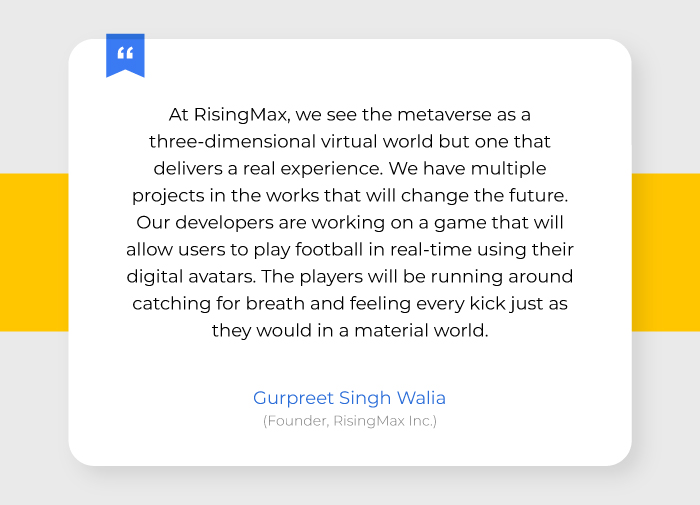
One of the best and most popular metaverse platforms I can cite is Decentraland. The platform allows users to buy land and build their own properties. Users can even visit different places offering versatile experiences. It is a digital world where users can live an alternate virtual life. It also recently hosted a metaverse fashion week with brands like Dolce Gabbana and Tommy Hilfiger. And this is just one example. Considering the pace of technological evolution, there’s a lot in store for the future.
So if the metaverse is a shared space where users interact with one another, does that increase dependency on AR/VR technology a lot more than now? If yes, please explain how AR/VR is used in implementing metaverse.
Definitely! Just like our material world is made up of water, air, sun, and soil, AR and VR are the basic elements that make up the metaverse.
We must understand that the metaverse is an extension of the real world. Now to create that extension, a virtual space is needed. But how is it created? With technologies like Augmented Reality and Virtual Reality. These two technologies are powering the metaverse.
Also, when we talk about the metaverse, we must discuss simulations, advanced 3D visualizations, and immersive experiences. AR and VR technologies are making it happen. So, in a metaverse where you can touch objects and try on new sneakers before buying them, you need this tech to make that happen. Also, if you remember the craze for Pokemon Go when everyone was chasing Pokemons using their smartphones.
In the future, we may find ourselves walking through the streets of Agra and admiring the virtual replica of the Taj Mahal or socializing with others while sitting in a condo in California. But that’s not the only use case for a metaverse. From immersive learning courses to virtual healthcare, the technology has the potential to transcend and digitize every field.
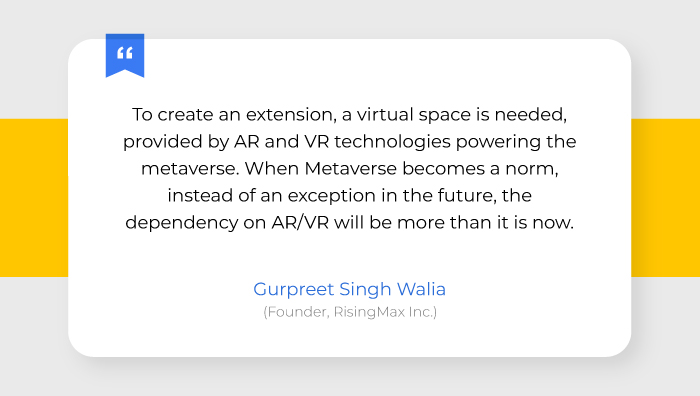
Is the AR/VR technology mature enough to support the activities performed in the metaverse? If not, what, in your opinion, are the shortcomings that need to be addressed?
The AR/VR technology we have today is advanced but will still need many years to be fully mature. Currently, these technologies are still a very niche for the public. When we say that metaverse is the future, we imagine industries of all sizes and types are merging into the metaverse. This includes education, real estate, gaming, automotive, healthcare, social media, entertainment, etc., which have the potential to evolve with the metaverse.
But, with such inclusivity of industries, you must also simplify public access. But it will take some time to reach that level of accessibility. In addition, AR/VR lacks convenience and control for the masses. If given a choice, what would you choose? A smartphone or a VR headset? Most people will use a smartphone simply because it’s convenient and gives them more control. So, there’s still a long way to go in design and technology for mass adoption.
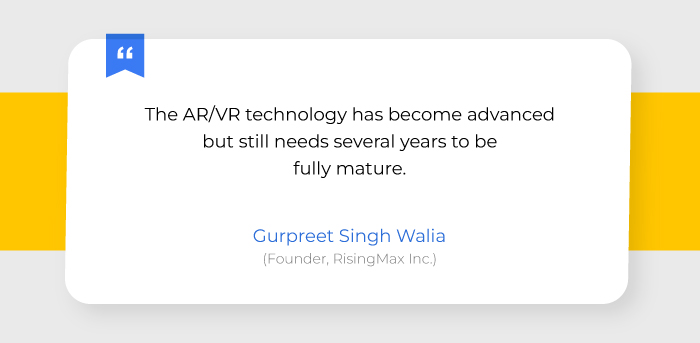
The gaming sector has seen the biggest adaptation of metaverse technology, and it is transforming completely. From portable gaming assets to play-to-earn elements to mixed reality experiences, it wouldn’t be wrong to say that metaverse is the future of gaming. Being a leading metaverse game development company, please let our audience know how the development of a metaverse game differs from traditional games.
The fundamental differences between a metaverse game and a traditional game are as follows;
- Metaverse games have much more to offer than traditional games.
- These games are much more social and more immersive than traditional games.
- The play-to-earn elements involve blockchain technology. When you play a game, there are rewards in terms of crypto or NFTs.
- Metaverse games are integrated with way more advanced technologies than traditional games. Traditional games are fundamentally different in terms of the tech stack.
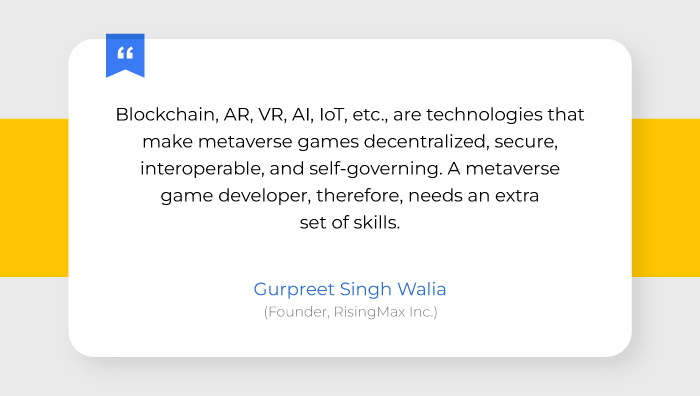
Metaverse game developers must be familiar with popular blockchain networks like Ethereum, Solana, and Polygon, besides UI/UX, simulations, and 3D visualizations. Also, clients may have specific preferences. Blockchain includes crypto and crypto-wallets. A developer must know how to tokenize rewards so that users can own digital assets and unleash benefits from them. They must also secure the crypto-wallet and make it transparent. Metaverse games may also include NFTs, which a regular game developer cannot create.
The use of the metaverse has already been widely embraced by the gaming industry, as we have already seen. What other fields, besides gaming, will the metaverse have a big impact on, and how will it be applied?
Honestly speaking, every business domain or industry can benefit from a comprehensively developed metaverse platform. A few relevant examples are cited below.
- We already have instances of entertainment in the metaverse. Ariana Grande and Travis Scott joined Fortnight's metaverse platform for a concert.
- We have witnessed the use of digital twins in educational institutions in the metaverse.
- Talking about travel and tourism, metaverse technology can be used to increase revenue.
- Similarly, the e-commerce and social media industry is also benefiting a lot from the metaverse.
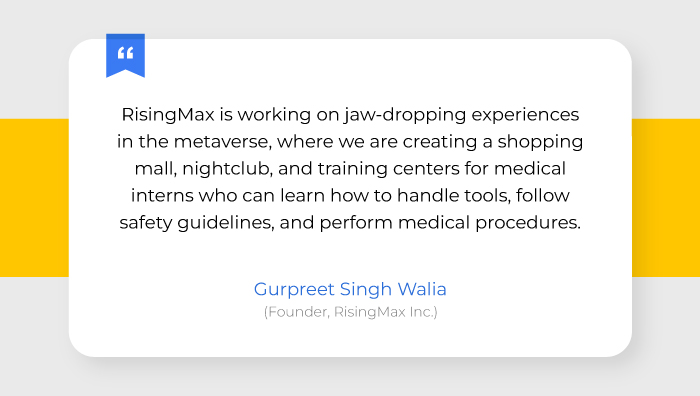
Talking about the ever-growing entertainment industry, How the metaverse will drive innovation in it? And, what are some of the challenges businesses and developers must be aware of?
When you step into the metaverse, you will get entertainment options like movies, amusement parks, art exhibitions, concerts, nightclubs, and games. You can enjoy all these activities with a realistic experience from the comfort of your home without actually visiting those venues.
For example, you can join a concert and have the same experience of standing in the crowd watching the live show and having a great time.
The major challenge for businesses is to understand the potential of the metaverse as early as possible and analyze how it can help them get ahead of their competition.
However, from a developer’s perspective, the challenges become more emphatic. We are still in the early days of metaverse technology. The developer community must enhance their skills to deliver impressive results. A wide range of tech stacks is involved in metaverse projects. Businesses must keep innovating, as the landscape will change for the next few years.

Presently, we have 4DX in movies. With the metaverse in place, there is the possibility of creating a more immersive movie experience where the user will become a part of the movie rather than just being an audience. We can extend this functionality to concerts, meetings, greetings, etc. Companies can gamify television, cinema, or any other form of content for more engagement.
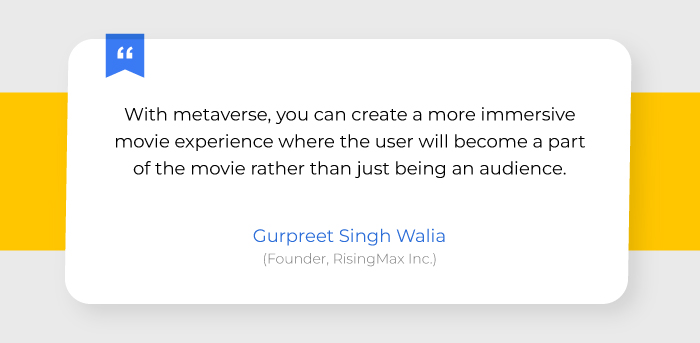
But, again, all this will require access to advanced technology by businesses and users. It should be convenient enough in terms of finances, time, and effort for the users to adopt metaverse in entertainment as a norm. This will be a significant challenge for businesses.
There are numerous uses of metaverse across multiple industries. But, there are a lot of hindrances when it comes to metaverse development. What are some of the challenges that developers face while working on developing a metaverse for their clients?
- I would say there is a dearth of awareness on the client’s part. They have heard about the metaverse buzzword but are uncertain whether to proceed further. Also, they don’t understand the limitations of this technology in creating high-resolution graphics that can run on ordinary systems.
- Time is the most crucial element in developing and launching the platform. A fully functional and complex metaverse can take months or close to a year. But sometimes, clients want to launch it next month.
- Another critical challenge is recruiting a fully skilled and experienced workforce. We are hiring people all across the globe who are experts in their respective fields and constantly train them to do better and learn new skills while doing the job at hand.
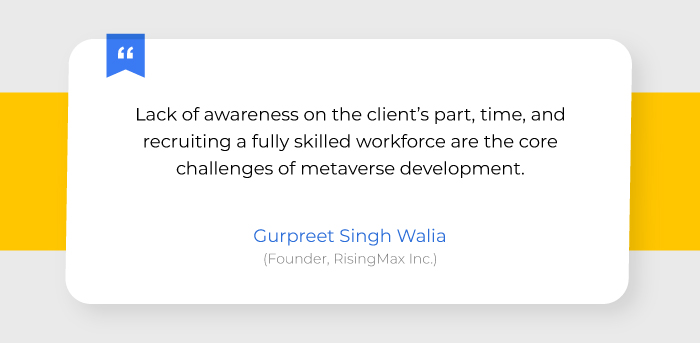
- The biggest challenge that metaverse developers face is delivering every requirement of the client. Also, each project starts from scratch and is fully customized per the client’s preferences.
- They need to maintain and optimize the resolution of graphics on different platforms depending on the place of metaverse deployment.
- They also have to figure out a way to keep the overall size of a platform small enough, even with multiple digital assets.
- When we talk about blockchain-based platforms, a huge amount of data must be stored, which is, again, a challenge for the developer. And with continuous changes in demands from the clients, this will keep piling up.
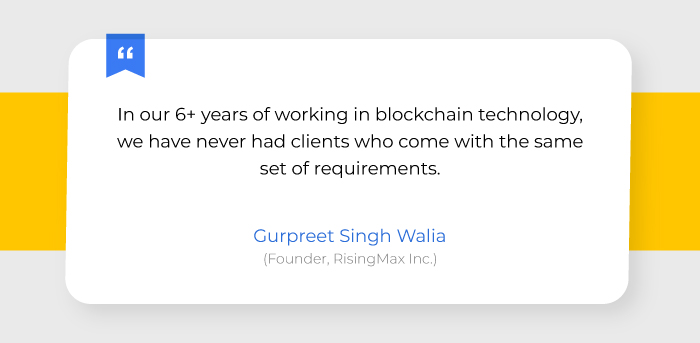
Seeing the rapid growth of metaverse technology, it is only obvious that more businesses will jump on the bandwagon. But what are some security issues businesses must know about before developing metaverse for themselves or their clients?
Like any other technology, there are security issues that still persist. Cyber attacks are a possibility in the metaverse. It generally includes credentials thefts, hardware or software bugs, and cyber-physical attacks where a user’s avatar can be compromised. We ensure that our clients are familiar with these issues before moving forward.
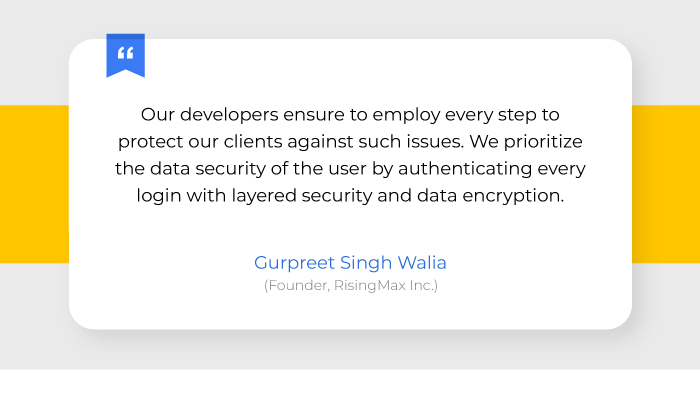
Here are a few robust and viable steps that you can take to bolster your metaverse platform security.
- You must prioritize the data security of the user by authenticating every login with layered security and data encryption.
- The QA team must conduct thorough testing before deployment.
- It becomes essential to carry out audits of smart contracts and provide maintenance to secure the platform.
Risingmax was established in 2018 and has worked on various projects based on blockchain, AI/ML, AR/VR, and metaverse technologies. How did such a young company pick up these technologies faster and emerge as the best in them? Please share a few tips on how other SMEs can do the same.
It was not a whim to take up the path of these emerging technologies. We have been keeping up with evolving technologies to dig deeper into them. Though it seemed like a quick escalation at the top, our progress was gradual and involved a lot of patience and hard work.
From the beginning, we knew our success would depend on the team we decided to work with. So, we curated a team with the expertise and the potential to take up the challenges and deliver.
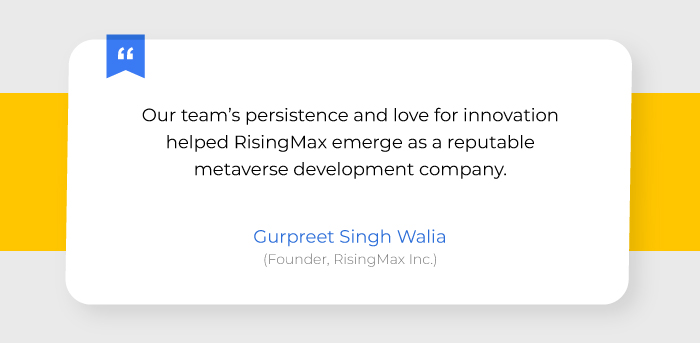
All marketing strategies and growth hacks come second. The first thing I believe every business needs for success is exceptional staff. They form the backbone of every enterprise. Once you have a strong team, you can focus on building great products or providing great service, conducting competitive analysis, employing marketing strategies, and everything that goes into building a successful enterprise.
Metaverse technology is just getting started, and I’m sure many more companies will be looking for the best metaverse development company that’ll help them utilize this technology fully. Please share how Goodfirms helps Risingmax appear as the best and hence grab the required attention.
We are on the way to creating a digital ecosystem powered by futuristic technologies. And we need a voice that takes our message to a wider audience. And Goodfirms is just the right partner for RisingMax.
We have provided measurable results to all our clients for many years. Our company has established a respectable position in the industry with quality work that delivers real results. Of late, several organizations are rising up in the industry that promises results but do not offer reliability. And we understand how important it is for businesses to find a metaverse development company they can trust. Goodfirms will help us build that trust and reliability.
To listen to this podcast discussion, click here.
What’s Next
Experts working with big tech titans have split and diverse views on how the metaverse technology will shape the future of this world. While Meta defines the metaverse as the big next evolution in social connection and perceives it as the successor to the mobile internet, its staunch rival Apple is more focused on building on Augmented Reality/ Virtual Reality advanced high-end headsets.
Metaverse is still in its nascent stage, and we have yet to explore its true potential. But yes, it is revolutionizing the world and will continue to do so in the near future with the combination of AR, VR, MR, and other transformative technologies.
If you are interested in sharing your views and experiences on any topic related to IT services, please email us at [email protected].








